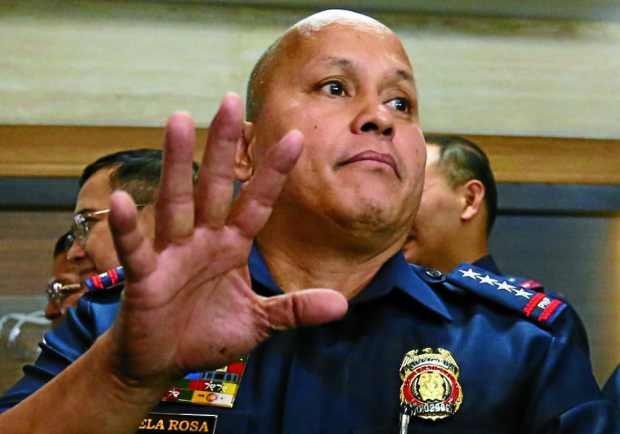PNP readying cases vs 5,000 in drug list

PNP Chief, Police Director General Ronald De La Rosa gestures during a press conference at Camp Crame, Quezon City.INQUIRER PHOTO/RAFFY LERMA
The Philippine National Police has started the case buildup against each of the 5,000 public servants—from barangay officials and mayors to governors, members of the judiciary and prosecutors—who are on the latest “validated” narco list of President Duterte.
In a press conference in Camp Crame, PNP chief Director General Ronald dela Rosa said most of the individuals on the list were village captains who should have been at the forefront of the government’s fight against illegal drugs.
“That’s our priority because the drug picture in the barangays will never change as long as these village captains are still there. They are not only drug protectors but drug lords themselves,” De la Rosa said.
He said the case buildup was meant to “neutralize” those on the list. He said “Oplan Tokhang” in which policemen knock on the homes of suspected drug personalities would be applicable only to small-time street pushers but not to high-value targets.
The President mentioned the new narco list during the San Beda College Law Alumni Homecoming on Saturday. He said the list would be submitted to the National Security Council and the legislative branch before the end of the month because the people on the roster posed a serious threat to national security.
Article continues after this advertisementFoot-high folders
Presidential Chief Legal Counsel Salvador Panelo said he had seen the one-foot high folders of narco list, which he said could serve as the basis for the suspension of the privilege of the writ of habeas corpus by the President.
Article continues after this advertisementPanelo parried criticisms that the President could suspend the writ mainly on two grounds: rebellion and invasion.
The 1987 Constitution empowers the President to suspend the privilege of the writ of habeas corpus only in cases of invasion or rebellion and when public safety requires it.
Drug money, rebellion
Panelo said Mr. Duterte believed that drug money was being used to fund the rebellion in Mindanao.
Dela Rosa warned those on the new list against leaving their houses to continue their illegal drug activities or they would be in for big trouble.
On the policemen who were coddling drug lords or engaging in illegal drugs, the PNP chief said their days were numbered.
Dela Rosa said he had since recovered from his emotional outburst during the Nov. 23 Senate hearing on extrajudicial killings as a result of the campaign against illegal drugs after senators insinuated that the Nov. 5 killing of Albuera Mayor Rolando Espinosa Sr. was a rubout.
Dela Rosa cried after hearing Espinosa’s son Kerwin say that Chief Inspector Jovie Espenido, the police officer whom Dela Rosa himself assigned to head the Albuera police station, was also allegedly involved in illegal drugs.
At the hearing, Kerwin said Espenido facilitated his ties with Ronnie Dayan, the former driver and alleged bagman of Sen. Leila de Lima. Espenido vehemently denied the allegation and Kerwin himself backtracked.
Tears of frustration
Dela Rosa said he shed tears of frustration and to show his sincerity in addressing the drug problem especially since police officers themselves were allegedly involved.
Dela Rosa likewise said he was pleased that the new narco list and testimonies from people involved had led to the discovery of new pieces of vital information on the drug trade.
These, he said, included the grounding of the group of Supt. Marvin Marcos who led the raid on the provincial jail that resulted in Espinosa’s death.
Kerwin has said that Marcos had asked P3 million from his father for the campaign of Marcos’ wife during the last elections and that only P1.5 million was given. Kerwin also said that Marcos was among the police officials who received drug money from him in exchange for protection.
On the group of police officials who wanted him out as PNP chief, Dela Rosa said the group had kept quiet. “They kept silent. They are now fearful,” he said.